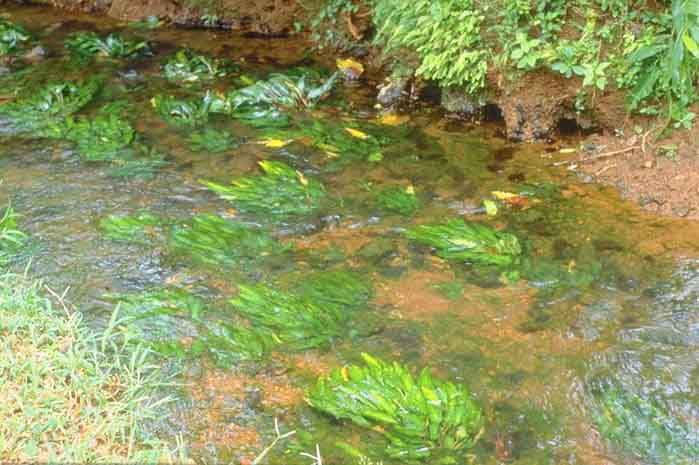 |
Patches of Cryptocoryne cognata in
their natural environment. As Patil cs. (1992) reported, they grow rather shaded.
photo S.R. Yadav |
|
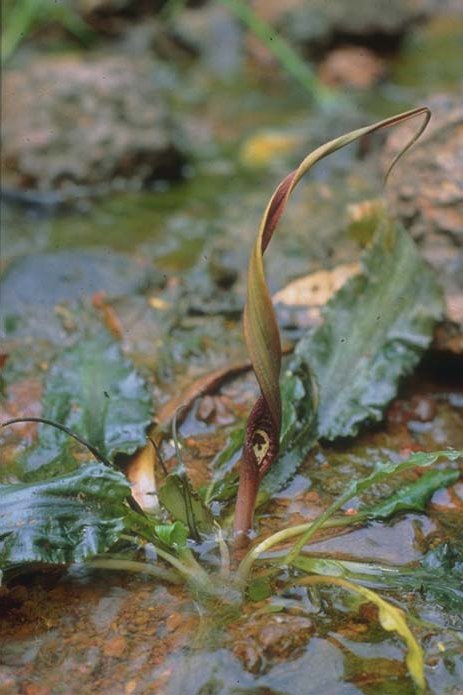 |
The opened limb is twisted. Note the the collar
and yellow throat with purple spots. The spathe reaches up to 30 cm.
photo S.R. Yadav
|
|
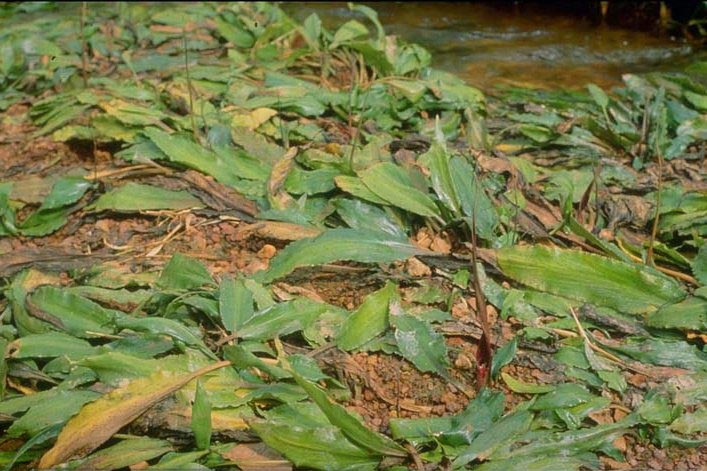 |
Flowering specimens on the riverbanks. The lower
part of the spathe is deeply buried into the ground, only the tube and limb of the spathe
are exposed.
photo S.R. Yadav |
|
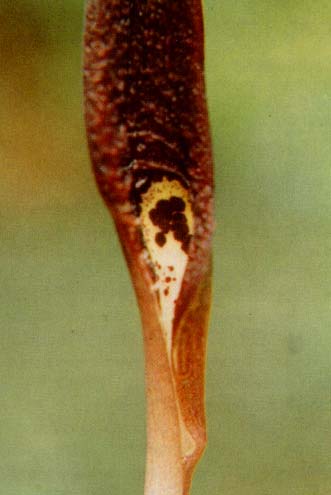 |
Patil cs. (1992) mentions that the fission of
the tube (the seem) is not firm, only slight pressed together or, as shown here, more or
less open. Note that just below the collar, the throat is yellow with purple spots.
photo S.R. Yadav
|
|
| |
|
|
|
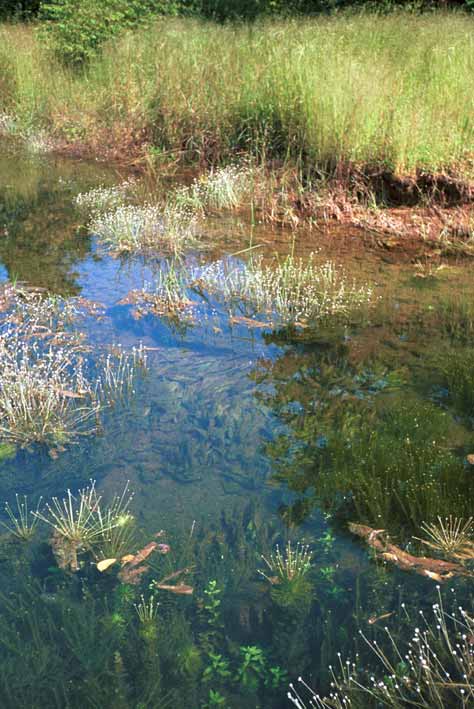 |
Stream in South West India with an abundant grow
of C. cognata.
photo te Beest
|
|
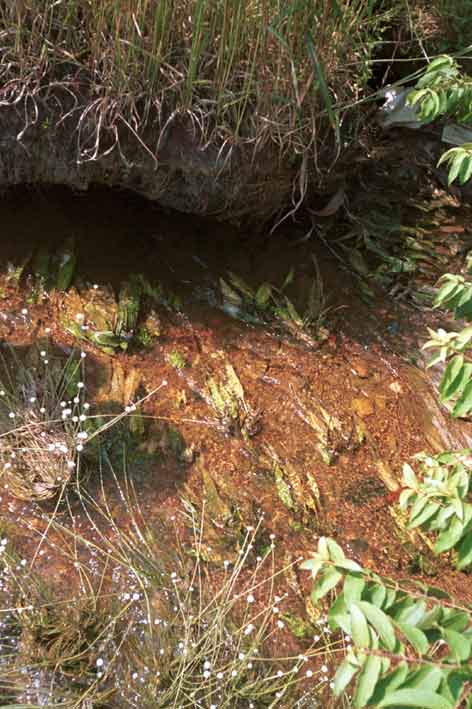 |
Close up of the locality with C. cognata in very shallow water.
photo te Beest
|
|
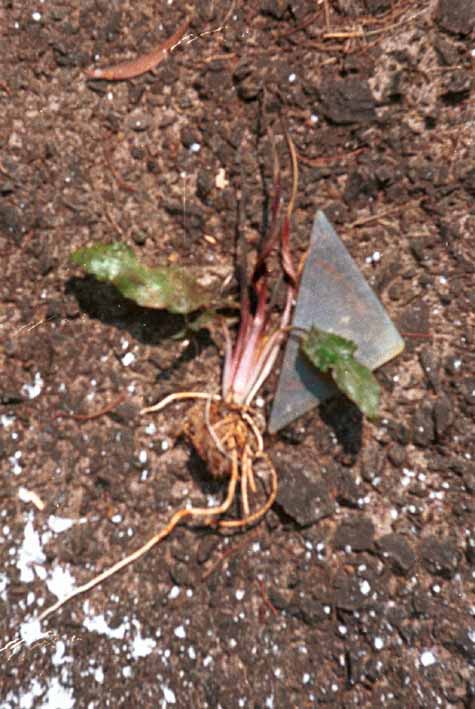 |
A collected specimen of C. cognata. The
long side of the triangle is 16 cm.
photo te Beest
|
|
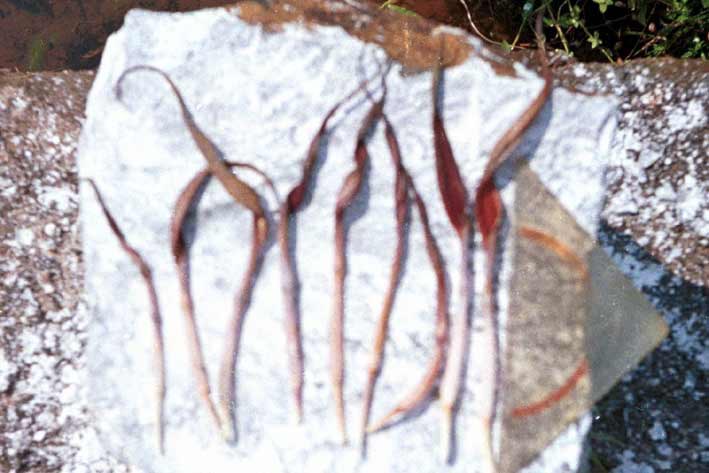 |
Though this picture isn't sharp, it gives a good
idea of the variation in the limb of C. cognata. The two spathes at right are
widely opened. Note the long lower part of the tube (the kettle).
photo te Beest
|
|
| |
|
|
|
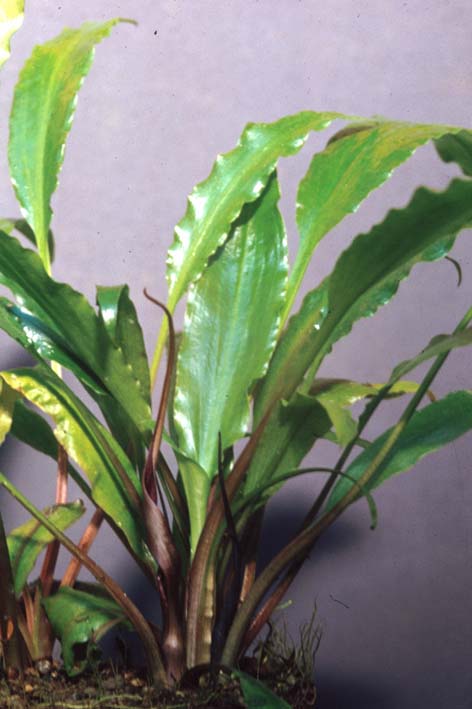 |
A cultivated specimen in the Botanical Garden
Munich. Note that at least the half of the (very long) kettle is buried in the ground.
photo Bogner
|
|
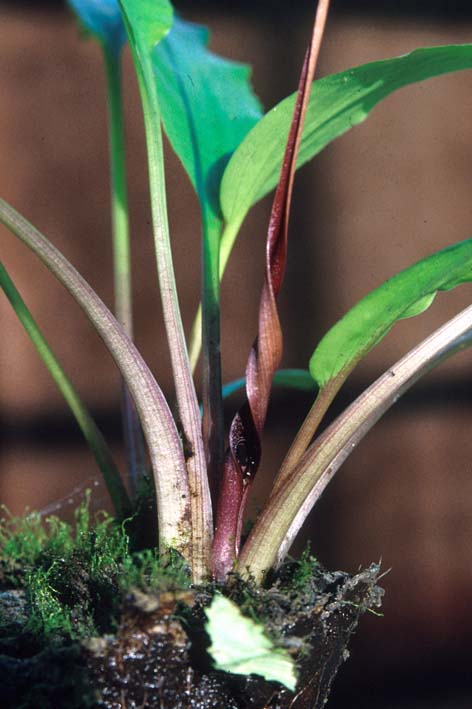 |
Another picture from Munich. Note the neatly
opened upper part of the 'tail' of the limb.
photo Bogner
|
|
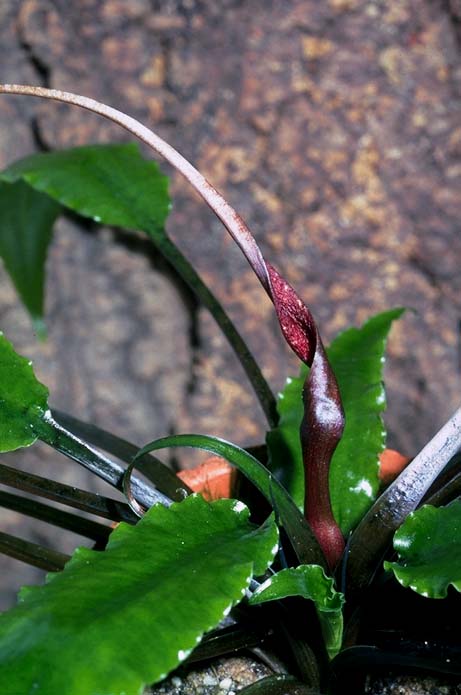 |
The limb of the spathe might be twisted one or
more times. The limb is mostly opened for at least two thirds of its length, the upper
part remains sometimes closed (as a tail). In culture, the spathe easily reach 20 cm.
Cathaphyls are very prominent and may reach up to 13 cm. |
|
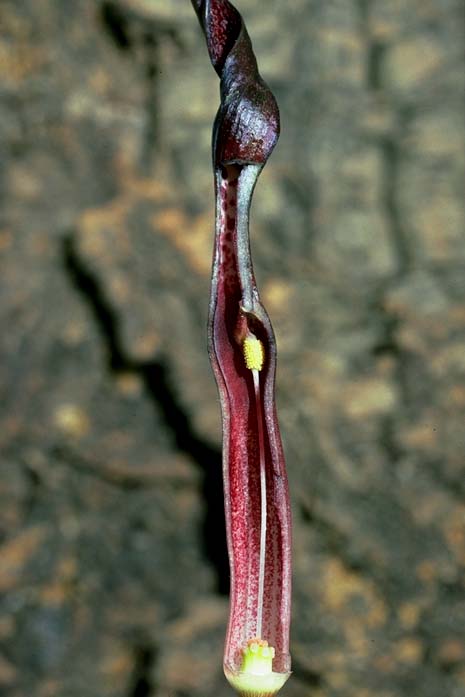 |
A length section of the kettle and tube of C.
cognata. The kettle reach up to 5 cm. Note the broadened part at the male flowers.
Inside there is a extremely long naked part of the spadix. C. cognata has
contractile roots like C. spiralis. Both species have their lower part of the
kettle deep in the ground.
|
|
| |
|
|
|
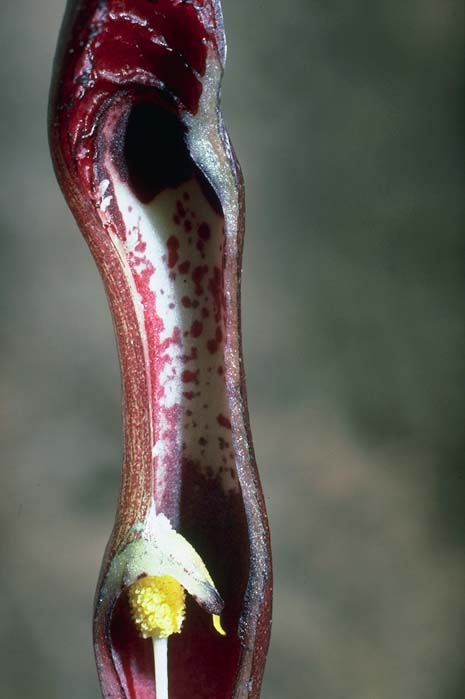 |
A length section of the tube of C. cognata.
The spots inside the tube are irregular, sometimes at the top of the tube, the spots run
together into an even purple color. The fusion of the tube is not perfect, but in culture
the tube was always closed (the left side in the picture is the fusion line).
Above the collar there are pronounced ridges on the lower part of the limb.
|
|
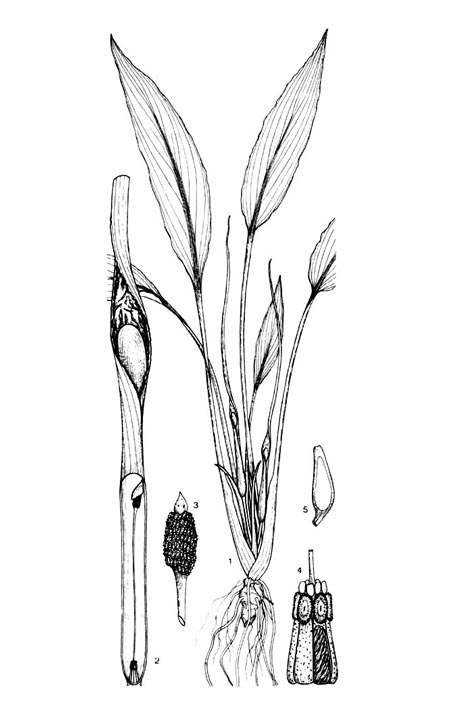 |
De Wit (1960, 1990) gives a very fine
description and drawing of C. cognata, mainly based on the famous 'Schott
drawings' at Vienna (A). De Wit remarks that the kettle is as wide as the tube.
drawing Ike Zewald
|
|
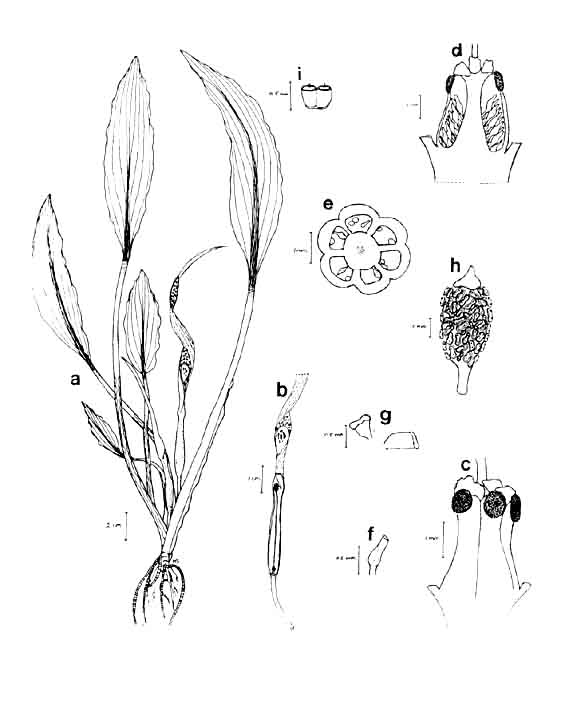 |
Te Beest recently made collections of C.
cognata.This drawing in found in Te Beest (1998).
drawing te Beest
|
|
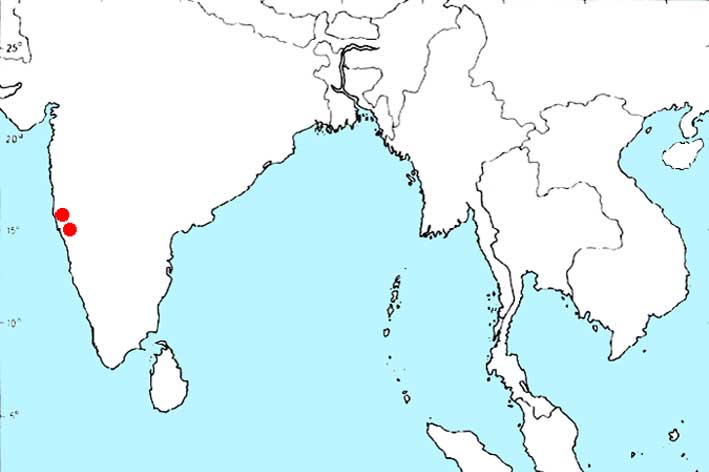 |
Distribution of C. cognata near
Ratnagiri in Maharashtra State in India. There are only two recent new localities known,
so the species must be regarded as endangered! (Patil 1992). Remains the miracle that this
species is found after 150 years!
|
|
| |
|
|
|
Cryptocoryne cognata is seldom seen in culture. That is not because the plant
is difficult to cultivate, on the contrary. Moreover, the plant is not sensitive for many
diseases. The problem is that C. cognata don't make runners. In about eight years
of cultivation, I had no one runner. Its not known whether or not C. cognata is
appropriate for aquaria.
C. cognatoides Blatter & McCann has nothing to do with C. cognata,
and is currently regarded as a variety of C. spiralis.
Updated March 2002 |
Literature.
- Beest, M. te, 1998. A taxonomic study of the genus Cryptocoryne
(Araceae) of South India. University of Calicut.
- Patil,K.S., S.R.Yadav, G.B.Dixit & J.Bogner, 1992. Eine lang verschollene Cryptocoryne
aus Indien: Cryptocoryne cognata Schott (Araceae). Aqua-Planta 2-92 : 59-65.
- Schott, H.W., 1857. Cryptocorynenskizze. Bonplandia 5(14): 219-223.
- Wit, H.C.D.de, 1960. Het genus Cryptocoryne 12, Cryptocoryne cognata Schott, Cryptocoryne
cognatoides Blatter & McCann. Het Aquarium 31(2): 31-32.
- Wijngaarden, P. van, 2004. Cryptocoryne cognata Schott. Aqua Planta 29(3): 98-107.
- Wit, H.C.D.de, 1990. Aquarienpflanzen, 2. Auflage. Ulmer, Stuttgart.
|
|